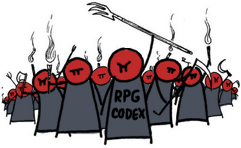The Warhammer 40k universe is almost an anomaly. It is a setting that is extremely exaggerated in its components, with strong satirical overtones and completely over the top; yet, it is very serious, gloomy (grimdark, to be precise) and above all so extensive and deep in the details of lore and internal history that it is almost impossible to know it in its entirety. In fact, we are talking about a game world so wide that all kinds of stories could be told within it with extremely varied characters as protagonists, and, absurdly enough, it would even be possible to set typically fantasy stories in it (not coincidentally, at one point such a hypothesis had been hinted at).
Thus, one would expect that florals of masterpieces have been drawn from such a setting, and that each game has taken advantage of the wealth of information available to the developers to create something deep and unique each time. Not so. In fact, if I were to think about the history of Warhammer 40k, the really worthy games are not very many, and the ones that can be called masterpieces...I honestly can't think of a single one. Maybe Dawn of War? I'm not 100% sure.
When I approached Darktide, I therefore did so with a mixture of resignation and hope. A cooperative online shooter in the style of the two Vermintide games, set in a hive city against hordes of cultists and assorted monstrosities, might well be interesting on paper, and something, in fact, is well done.
The right tools to destroy the heretic
The representation of the various weapons found in the Warhammer universe, for example, is among the best I have ever seen. Never has a Lasgun, Bolter, or Ogryn equipment been created with such maniacal care for direct use; this allows one to enjoy the devastation these weapons are capable of sowing in utterly satisfying ways. Unlocking a Bolter and watching enemies turn into confetti of blood and red mist is delightful, and, to give a sense of the satisfaction there is in using a Bolter to those perhaps unfamiliar with the setting, I can describe it this way. Imagine a machine gun or rifle, as the case may be, firing projectiles the size of your fist; the fact is that they are not just bullets, but miniature rockets that after penetrating inside the enemy explode. It is like having a rocket launcher machine gun! Pure destructive poetry.
The care with which these weapons are represented is in turn very true to the setting. Each weapon is rightly activated each time it is drawn to appease the spirit within it (more sensible for some, less so for others, but it is still a detail of the setting) and I particularly appreciated some subtleties normally seen only in more realistic "war simulators," such as the fact that the reloading process is "staged."
Basically, if you start reloading the weapon and halfway through the animation you have to stop, perhaps because a monstrosity comes out and you have to draw your sword to defend yourself, when you return to the firearm you resume the animation from the "logical" point at which it was interrupted. If, for example, you draw the empty magazine, insert the new one but then have to draw your sword to take out an enemy, returning to the firearm leaves only the bolt to be unwrapped before you are ready to fire, where a great many other shooters would force a restart from the empty magazine draw animation. It is almost bizarre to see such attention to detail in such a game.
The problem is that, beyond the general fidelity to the setting and the satisfaction of using the weapons, the rest of the game did not particularly impress me. The plot, to begin with, is rather superficial. The player is a prisoner who is freed by chance during an uprising; he is taken on as cannon fodder by the Inquisition and then used for the most dangerous and menial jobs (at least at first) and treated as garbage until, as he slowly levels up and gains "trust," he is considered a more or less respectable agent.
Having chosen one's class from four available, one can play or skip a prologue (best played the first time or two), and then begin accepting assignments in the city of Tertium to counter a demonic infestation that threatens to overwhelm its defenses. The quests themselves are of various types, but with a few exceptions they always involve facing hordes of weak enemies with the occasional stronger-than-normal opponent (or perhaps a boss), then activating some switch or mechanism to finish the assignment before fleeing to the final escape point, often pursued by yet another horde of enemies.
A crime against the emperor
Does that sound exciting? Yes. Perhaps. Maybe it is for the first ten times, not to mention that character and weapon evolution can make it fun a little longer, but in fact all missions are the same. We are not even talking about a Left 4 Dead, where at least the setting is different between levels and there is a feeling of progressing toward something. In Darktide, on the other hand, it seems (and sadly) to be doing the same thing over and over again with slight variations, so much so that at one point I honestly couldn't take it anymore to reactivate water systems, kill corruptions, or take out the enemy captain on duty, who by the way always had the same weapons and always had the same fighting style.
Repetitiveness is, as far as I am concerned, Darktide's greatest crime, which ultimately consists of eternal grinding to unlock better equipment without any real sense of progression within an interesting plot or situation. One does not feel important or as if one is making any real progress; rather, it feels as if one is a prisoner of a static hopeless situation, doomed to fight forever. Which, while a bizarrely faithful approach to the original setting, is also a major flaw for a video game.
The four classes are fairly well characterized. They range from the veteran, who is perhaps the most suitable character for those accustomed to classic shooters, to more exotic characters such as the psionic or the Ogryn. The psionic, of all the classes, is the one that perhaps has the most fascinating and complex mechanics; he can in fact use a number of supernatural powers but in doing so he generates Danger and draws the attention and influences of the Warp upon himself, even to the point of risking exploding (literally) if he is not careful, causing severe damage to anyone around him.
If, on the other hand, one prefers to deal with enemies in a more personal way, one can use the Zealot, focused on inflicting serious damage in close combat, or the aforementioned Ogryn, a very large but mentally retarded abhuman with great physical strength. The balance between the various classes is quite well done; each character seemed to me as powerful as befits a Warhammer game, and clearly each class is designed to fall into more or less precise roles. The psionic is very effective at eliminating elite enemies by blowing their brains out from a distance, while the Ogryn is very good at stopping and managing hordes, and so on.
There is also a fair amount of variety in the elite enemies as well. Between hell hounds, snipers, gunners, and more, you always have to keep your guard pretty high and the strategy for dealing with each of these opponents is always different, unless you are using psionics. There is also a boss similar to the witch from Left 4 Dead that you should try not to disturb, as it has the potential to kill more than one team member. When it is present, it creates some tension but is also a source of frustration when you happen to be on a team with someone who is not paying attention and goes to awaken it.
The main problem with the game is that there is not much else. Sure, leveling up unlocks extra weapons, but personally I felt no real sense of progression, and once I got past twenty hours of play, boredom took over due to the repetitiveness of everything. The presence of a store that sells in-game aesthetic items is then a detail that, as always, turns my nose up at it; the game is not a free-to-play and trying to take more money from players is never going to be something I will view positively, even if it is not purchases that offer in-game advantages (as is the case in other titles).
There are other things that puzzled me. The developers decided not to have pre-set characters as in Vermintide, but to allow the possibility of creating one's own custom character to allow each player to have something unique. Character creation is also relatively in-depth; one can choose the character's origin system (Cadia, always, for me) and some details about one's past, but none of these choices have any real importance and effect on gameplay.
Some choices, perhaps, have a vague influence on what the character says during the mission, but it is far too little. Also, while it is true that the world of Darktide is not renowned for being full of photomodels (and I am perfectly fine with that), I am not sure I appreciate the fact that most of the characters and faces are almost deformed.
More positive judgment on graphics and audio. Tertium's monsters and architecture are depicted with a very good level of detail, and the equipment being used is definitely well done. Kudos also to the soundtrack curated by Jesper Kyd, which is definitely exhilarating at times and manages to make the game come alive more than it otherwise would.
However, the technical aspect of the game is not entirely positive. There are still bugs, such as some items to which players are entitled not being correctly added to the game account, as well as sporadic crashes. These are flaws that will probably be fixed in the future with appropriate updates, but I have to judge what I have in my hands now. Reading that the developers had promised the ability to play alone with bots and then not having that option is another bad thing, but the absence of dedicated servers (which should be added in the future anyway) is also frustrating. Also, some of the crafting features are not currently active, with generic promises that they will be activated "in the future." The store for spending real money is there, though.
Verdict
Darktide is a game that unfortunately wastes the enormous potential of its setting. Shooting hordes of cultists all the same is fun in the short term, but repetitiveness takes over all too quickly, and with it comes boredom, which to use one of the terms so dear to the setting is outright heresy when it comes to a video game. Some people may like the idea of playing the same maps and quests over and over again, but I do not think it is possible to judge something so superficial as this in a positive light. The setting of Warhammer is rich and deep, and that is another reason why a much better result was expected.































